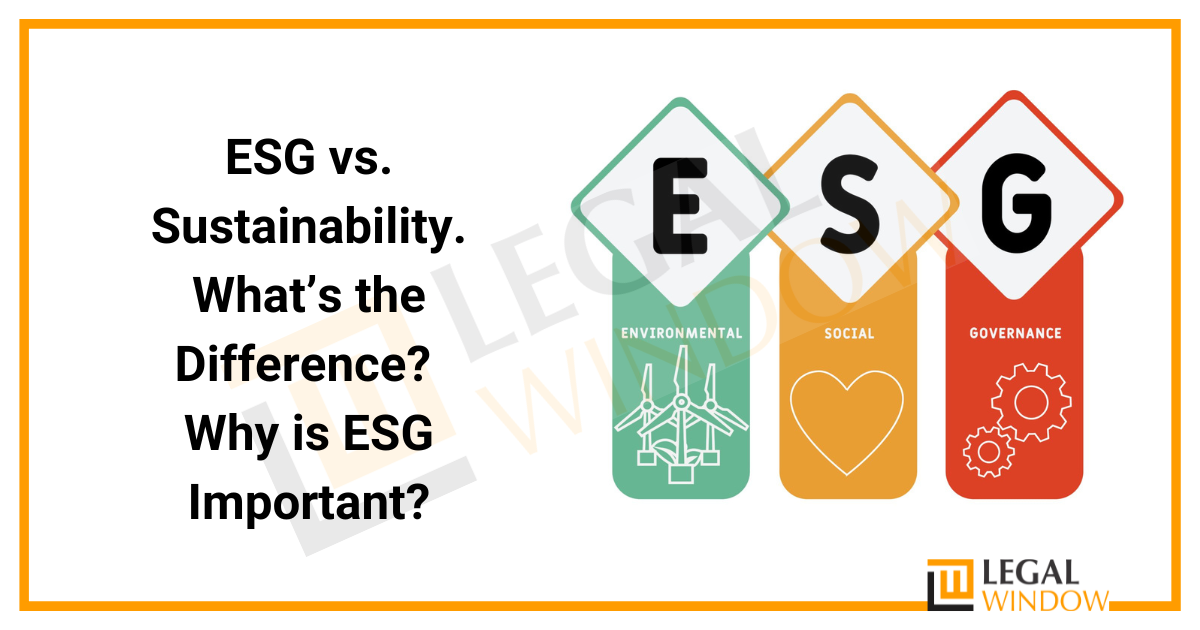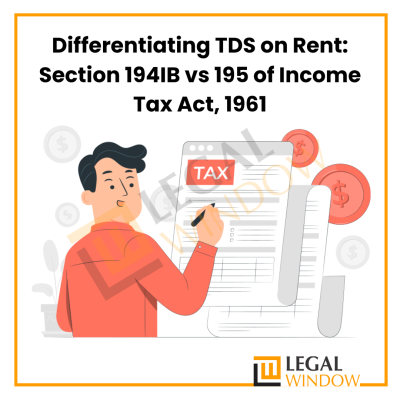ESG vs. Sustainability – What’s the Difference? Why is ESG Important?
- December 16, 2022
- Miscellaneous
 ESG (Environmental Social Governance) and sustainability are sometimes used interchangeably in conversations. It’s usual to believe that sustainability is only one pillar or sub-component of total ESG because the “E” in ESG stands for “Environmental.” This is somewhat accurate, however, there are significant distinctions between ESG and sustainability that have an impact on business strategy, reporting, and prioritizing. Despite being connected, ESG and sustainability refer to two separate ideas. Your company can follow best practices for successful results by comprehending ESG vs. sustainability and how they affect investors’ judgments in today’s marketplaces. In this write up we will discuss The Difference between ESG and Sustainability.
ESG (Environmental Social Governance) and sustainability are sometimes used interchangeably in conversations. It’s usual to believe that sustainability is only one pillar or sub-component of total ESG because the “E” in ESG stands for “Environmental.” This is somewhat accurate, however, there are significant distinctions between ESG and sustainability that have an impact on business strategy, reporting, and prioritizing. Despite being connected, ESG and sustainability refer to two separate ideas. Your company can follow best practices for successful results by comprehending ESG vs. sustainability and how they affect investors’ judgments in today’s marketplaces. In this write up we will discuss The Difference between ESG and Sustainability.
| Table of Content |
Short Glimpse
ESG and sustainability are undoubtedly the greatest topics right now. Both terms indicate the direction the world is moving in and are frequently used interchangeably and more frequently in the same phrase. Both deal with social and environmental issues, but there are clear differences between them in terms of revealing and benchmarking data.
Investors of today are evolving. A few decades ago, investors demanded that businesses produce healthy profit margins and estimate future monetary growth. However, investors’ objectives are changing as the years go by. They now choose to invest in businesses that have a focus on ESG principles since they increase risk tolerance and long-term profitability.
Let us first go through the meaning of ESG and Sustainability before we shall move on to discuss their respective differences.
Meaning of ESG
ESG is far more specific and data-driven than simply “becoming green” or being a productive member. ESG stands for Environmental, Social, and Governance. ESG is primarily a framework for corporate governance and investment. In practice, organizations that follow ESG principles evaluate, quantify, disclose, and try to improve their business’s environmental, social, and governance components in addition to its financial concerns (profit, growth, expenses, and accounting).
ESG is made up of three parts, which are as follows:
- E – Environment – Describes how a company decreases its environmental effect, which has far-reaching implications for the society in which it works and the planet. Through corporate decision-making and investments, this ESG category essentially incorporates the description of corporate sustainability — balancing the environment, economy across products, energy usage, packaging, facilities, people, and waste in a way that does not contribute to climate change, global warming, and biodiversity loss.
- S – Social – Describes how a company looks after its employees and helps their overall success. Their inclusion and diversity will pave the path for a more sustainable future.
- G – Governance – This term refers to how a company maintains compliance, transparency, best industry practices, and bidding with regulators. It also guides the internal system of practices, processes, and controls that must be followed in order to make sound judgments.
Why is ESG Important?
More and more businesses are becoming acquainted with the numerous and readily available benefits of ESG, such as targeting potential customers, recruiting exceptional employees, allowing innovation, and brand improvement. Overall, ESG equips companies to be resilient in present and likely future conditions. Some of the primary benefits are detailed below to help you understand why ESG is more essential now than ever:
- Allow a way for extraordinary Growth: Businesses with a solid ESG strategy find it simple to enter new markets and expand their operations since they have the backing of all stakeholders. The government also assists ESG Complaint organizations by granting approvals and licenses without delay.
- Cost savings: Organizations that choose more sustainable methods of manufacturing are more efficient and have lower expenses.
Nestlé, for example, recently declared that it will invest up to USD 2.1 billion by 2025 to transition from virgin plastic packaging to food-grade recycled plastic packaging and move to other sustainable packing options. This measure will not only reduce the company’s carbon footprint but will also save money on non-compliance charges in the many locations where it works and where the law prohibits the use of plastic for packaging.
- ESG Investors are “Long-Term” Investors: ESG investors are values-oriented investors who are more concerned about what occurs over the next decade than the next quarter; they recognize that change takes time. ESG investors frequently collaborate with organizations to enhance them, as they are more interested in creating long-term value over a decade than in flipping the stock in the following year. Customers are also loyal to such brands. According to a new poll by Gen Z Buyers Demand Sustainable Retail, the vast majority of Generation Z shoppers prefer to buy sustainable products and are willing to pay 10% more for them.
- Active stakeholder management and governance Compliances: All forms of enterprises that are governed by some regulatory body and its regulations in the market in which they operate. Organizations with excellent ESG standards, particularly in governance, faceless scrutiny from authorities, and greater operational independence. They also face less pressure from employee and trade unions, climate change advocates, and so forth.
- Attracting Talent and Enhancing Staff Productivity: It should be mentioned that higher ESG ratings attract superior personnel and have a longer retention rate. Employees feel more proud when they have a clear sustainability plan. The younger generation prefers to work for organizations that have higher societal and global obligations.
Meaning of Sustainability
Sustainability has been linked with “lowering your carbon footprint” or “becoming green” during the previous decade. As a result, when people think of sustainability, they think of things like lowering the use of fossil fuels and energy and tracking carbon and other greenhouse gas emissions. However, that is a rather limited concept of sustainability.
Sustainability is an umbrella word for “doing good,” and it encompasses all of a company’s ethical and responsible business practices in order to decrease its influence on the globe. It includes terms like “green” activity, “Corporate Social Responsibility” (CSR), “net zero” and “low carbon footprint,” “energy, water, and resource conservation,” “circularity,” “diversity and inclusion,” “human rights,” “green supply chain,” “health and safety,” and “product stewardship,” among others.
The three Ps of sustainability is a well-known business idea, commonly known as the triple bottom line. The three Ps stand for People, Planet, and Profit. A company’s balance sheet must incorporate people and the environment in addition to the profit line. Sustainability is critical to safeguarding and optimizing the benefits of the three Ps. People are taken care of through green initiatives. They accommodate the planet’s requirements by protecting its valuable resources, and they strive for profit without waste.
Furthermore, various organizations may define sustainability differently. Activity that comes under the sustainability umbrella varies depending on the company and its activities, however, they may include:
- Disposing of paper
- Accounting for GHGs
- Acquisition of energy-efficient office equipment
- Auditing of waste
- Providing compensated volunteer days
- Keeping a DEI (diversity, equity, and inclusion) expert on retainer to evaluate organizational practices
- Organizing a stream or highway cleanup
Sustainability plans enable companies to be innovative in identifying possibilities and activities that are appropriate for them and their workforce. Some companies may even use the chance to assess goals and accomplishments, while others will launch new projects each year.
Companies, however, struggle to wrap their heads around such a good idea due to the tremendous prospects and lack of guidance. As a result, most companies have never completely incorporated sustainability. Many people have a hazy understanding of what they are expected to achieve and struggle to measure and report on performance.
The Difference between ESG and Sustainability
Although ESG and sustainability have many parallels and purposes, there is one major difference: sustainability is ambiguous, whereas ESG is specific and quantitative. While various companies define sustainability differently, ESG provides a precise set of criteria — notably, environmental, social, and governance — that firms may monitor and report against.
- ESG is concerned with business identity, decision-making, and stakeholders – the CEO, board, shareholders, workers, and other stakeholders — whereas sustainability is concerned with a company’s connection with the environment.
- ESG includes sustainability as one of its three components but also considers the larger picture, as well as social and corporate governance issues.
- ESG is more practicable for large companies that are publicly traded or require investment from institutional investors. However, many banks and financial corporations are already adopting ESG concepts, and as a result, ESG is becoming increasingly important to startups and smaller businesses.
- ESG is an investment framework that supports external investors in evaluating a company’s performance and risk, whereas sustainability is a framework for making internal capital investments (i.e., taking up energy efficiency measures like installing LED light bulbs or purchasing sustainability measurement software program)
- ESG is based on benchmarks established by policymakers, investors, and ESG reporting organizations (for example, GRI, MSCI, TCFD), whereas sustainability standards, while established by standards bodies such as the GHG Protocol, are more standardized and science-based. There are several frameworks for assessing ESG, although carbon (CO2) is carbon, and sustainability criteria are not very innovative.
- Finally, the impact lens distinguishes ESG from Sustainability: ESG considers how the world impacts an investment or a company, whereas sustainability considers how a company (or investment) affects the world. The distinction is subtle but significant. The whole risk and materiality profile of ESG is where ESG goes beyond and differentiates from sustainability.
Sustainability to ESG
The transition from sustainability to ESG performance indicates a shift in business practices toward more precise measurement of a company’s performance. There is a great demand for improvement in how we gather and track ESG management as the sector grows and becomes more sophisticated. Sustainability managers frequently work on environmental projects with outcomes that can be measured using comparable metrics like energy concentrations or gallons of water consumed.
They engage stakeholders in these activities through advertising, marketing efforts, and surveys. And, based on the findings of these surveys, they formulate sustainability goals that may involve aggressive carbon-cutting or offset initiatives in all facets of their companies.
These Sustainability efforts are related to ESG in the sense that they
- Fulfill the particular description of ESG and
- Are quantifiable.
While quantitative measures such as energy usage are more easily evaluated, there are several activities for which no regulations exist and are carried out at a certain time with documentation to prove they were carried out. All of these measures may bring value to a more sustainable company, but these activities are considerably better documented at the implementation stage by viewing them through the lens of ESG rather than the broad umbrella of sustainability.
ESG has also become an increasingly important indicator for capital markets. Organizations with excellent ESG performance have reduced risks, greater returns, and are more resilient in times of crisis.
 Endnote
Endnote
Sustainability is a catch-all word for all or any of a company’s attempts to “do well.” ESG, on the other hand, is focused on three distinct pillars that are critical for today’s business executives and investors. While worldwide corporate leaders undoubtedly recognize the importance of sustainability, most small companies still regard it as a “nice-to-have” rather than a “must-have.”
Companies are facing more scrutinizing queries about their performance in the ESG framework now that ESG has become a key factor for judging a company’s success. While the majority of ESG disclosures are optional, these standards have become a continuous requirement for important stakeholders such as bankers and investors.
Connect to our Experts at Legal Window if you want more information at The Difference Between ESG and Sustainability
LegalWindow.in is a professional technology driven platform of multidisciplined experts like CA/CS/Lawyers spanning with an aim to provide concrete solution to individuals, start-ups and other business organisation by maximising their growth at an affordable cost. Our team offers expertise solutions in various fields that include Corporate Laws, Direct Taxations, GST Matters, IP Registrations and other Legal Affairs.
Categories
- Agreement Drafting (23)
- Annual Compliance (11)
- Change in Business (36)
- Company Law (148)
- Compliance (90)
- Digital Banking (3)
- Drug License (3)
- FEMA (17)
- Finance Company (42)
- Foreign Taxation (6)
- FSSAI License/Registration (14)
- GST (120)
- Hallmark Registration (1)
- Income Tax (202)
- Latest News (34)
- Miscellaneous (165)
- NBFC Registration (8)
- NGO (14)
- SEBI Registration (6)
- Section 8 Company (7)
- Start and manage a business (21)
- Startup/ Registration (130)
- Trademark Registration/IPR (40)
Recent Posts
About us
LegalWindow.in is a professional technology driven platform of multidisciplined experts like CA/CS/Lawyers spanning with an aim to provide concrete solution to individuals, start-ups and other business organisation by maximising their growth at an affordable cost.








